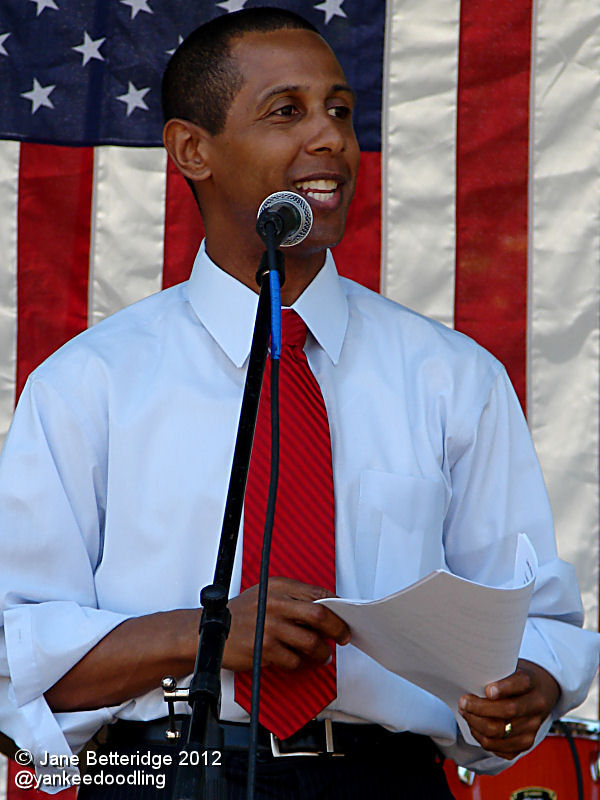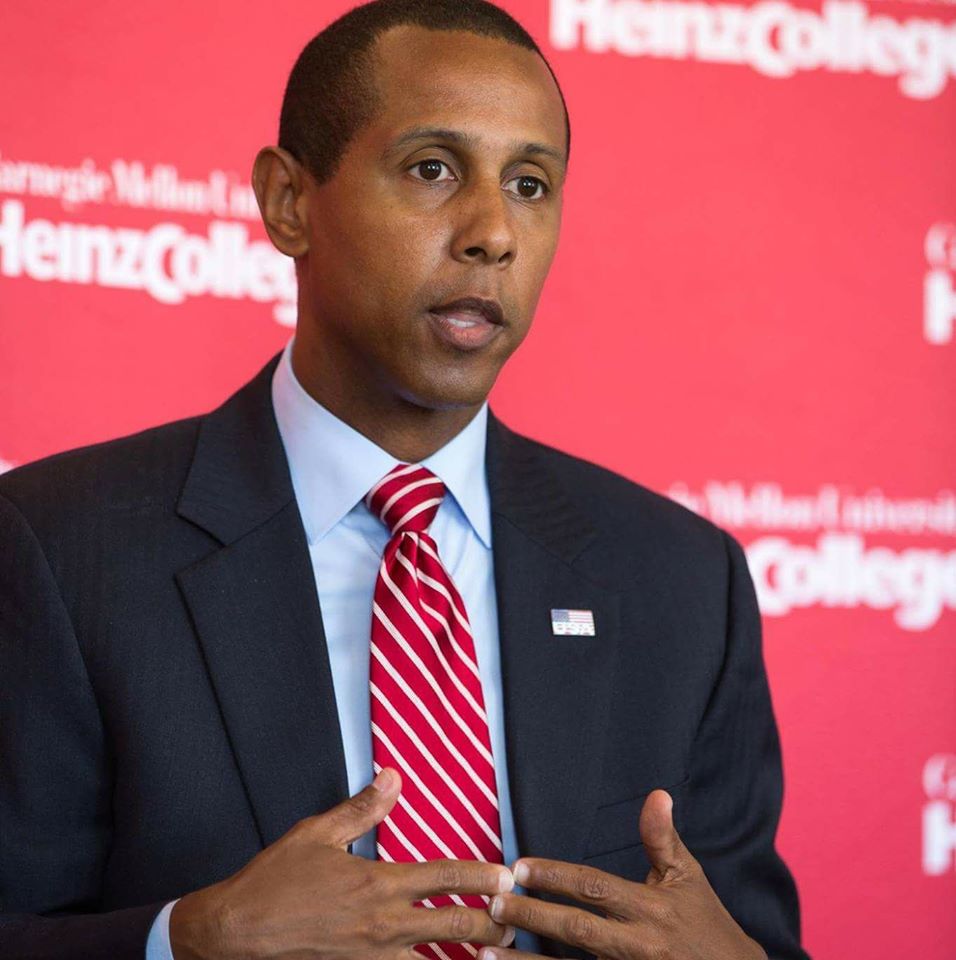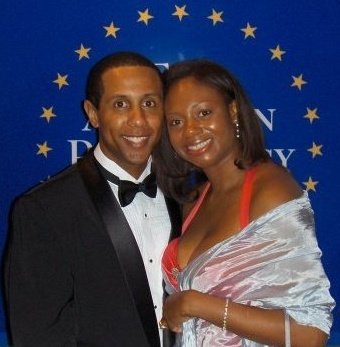Commentary
Meet Lenny McAllister
Lenny McAllister joined Commonwealth Foundation in early 2017 as the first director of entrepreneur engagement in western Pennsylvania. A Pittsburgh native, Lenny has spent years working in both state and national politics, the civil rights community, and in the media. Recently, CF Vice President Jennifer Stefano sat down with Lenny to discuss his path to Commonwealth Foundation and his enthusiasm for helping Pennsylvania write a new chapter in America’s story.
Jennifer Stefano: Lenny when I first saw your resume I was really excited because it was not the typical resume the Commonwealth Foundation usually gets. It was unique. Tell me a little bit about what led you here.
Lenny McAllister: Joining the Commonwealth Foundation is a continuation of my focus to make my community, my native state of Pennsylvania, and our country better. And whether it’s been my media experience or my community activism working in urban Pittsburgh or the south side of Chicago, I found there was a common thread. And that common thread was a desire to be empowered.
I found it to be natural to want to be on board the Commonwealth Foundation team. The values are very similar.
You were educated at Davidson in the south and have a broad experience across national media. You could have landed anywhere, why did you come back to western Pennsylvania?
 I came back home for multiple reasons. Personally, it was a opportunity to enhance the lives of my two older children to make sure that they had the opportunity to grasp their personal greatness, and they’ve taken full advantage of that. From professional, political, and historic perspectives, I came back home because the disparities here are greater, the struggles here are greater, the potential here is greater, and the gap between where we are and where we need to be is greater. And I felt that, based on my experiences, I had a unique obligation to come address that and fill that void. Because as Pennsylvania goes, the Northeast goes; and as the Northeast goes, so goes the rest of the nation.
I came back home for multiple reasons. Personally, it was a opportunity to enhance the lives of my two older children to make sure that they had the opportunity to grasp their personal greatness, and they’ve taken full advantage of that. From professional, political, and historic perspectives, I came back home because the disparities here are greater, the struggles here are greater, the potential here is greater, and the gap between where we are and where we need to be is greater. And I felt that, based on my experiences, I had a unique obligation to come address that and fill that void. Because as Pennsylvania goes, the Northeast goes; and as the Northeast goes, so goes the rest of the nation.
So you believe that at CF we aren’t just changing public policy, but we have the opportunity to lead the country and change the course of human history once again through Pennsylvania? As your supervisor, this should make me nervous. But I agree with you! I agree with you 100%!
You worked with Rev. Jesse Jackson on the Rainbow/PUSH Coalition. I think a lot of conservatives would be surprised. How did you get in there? Did you have to go undercover?
I had a radio show on the South Side of Chicago. Al Sharpton had a radio show and Rev. Jesse Jackson had a radio show (on the same station). They knew what side of the political aisle I’m on. But they also knew I was dedicated to justice, to equality, and to seeing all Americans lifted up regardless of racial or socioeconomic backgrounds. When you walk into an organization like Rainbow/PUSH with that perspective, many of the issues I pushed as a conservative made sense to them: educational equality; economic advancement; job creation; and criminal justice reform. These are things most Americans want for our children. So, it was very easy to get on the same page to talk about the end goal. From there, we enjoyed opportunities to debate how to make those goals a reality.
That’s my approach from quality education to welfare reforms. When I spot a problem, I’m not going to waste time pointing fingers. I’m focused on the goal to enact the change.
What was it like working with Rev. Jackson when you certainly have very different political viewpoints?
 One of the most impressionable memories was at the end of a civil rights trip. As we were landing in Chicago, he expressed concern about what “side” I was fighting for. He worried that, despite having a heart for doing what’s right to improve lives, my methods wouldn’t yield any progress. And I explained to him my approach to improving our communities and country, that it was very much similar to his “keep hope alive” message.
One of the most impressionable memories was at the end of a civil rights trip. As we were landing in Chicago, he expressed concern about what “side” I was fighting for. He worried that, despite having a heart for doing what’s right to improve lives, my methods wouldn’t yield any progress. And I explained to him my approach to improving our communities and country, that it was very much similar to his “keep hope alive” message.
I told him, “Reverend, before you worked to desegregate Greensboro, North Carolina, as a college student in the ‘60s, there were segregated fountains and bathrooms. In your hometown in South Carolina, you couldn’t use the public library. As you worked to desegregate Greensboro, people told you that staying in the south was pointless, and there would never be change. Yet, when I attended Davidson College in North Carolina, I never once encountered a segregated bathroom, a segregated restaurant, or a segregated fountain thanks to the change you ignited. They said it couldn’t be done, but somebody just had to enact the change. It took courage. It took faith. It took vision. It took someone to do the work. And it got done. I’m merely following that example now.”
He looked at me, nodded, and said, “That’s a valid point, Mr. Lenny,”—he always called me Mr. Lenny—“but just stay focused on the goal.”
That’s my approach from quality education to welfare reforms. When I spot a problem, I’m not going to waste time pointing fingers. I’m focused on the goal to enact the change.
Wow, that’s awesome. You were a lone conservative amongst liberal giants. Are there lessons we can learn as people that often believe in the same outcomes but a different path?
I learned that people are desperate for viable solutions that will improve the lives of their neighbors and their communities. That is an American pursuit, not just an African-American pursuit. And when we as conservatives articulate our goals, our vision, and our plans effectively, people will get on board and follow us down that path.
Iron doesn’t sharpen iron just by paying for something. It happens through beliefs, through challenges, through communication, and through experiences.
Tell readers what it means to work in “entrepreneur engagement” on our team. Is it just about raising money?
Money in and of itself is nothing more than a resource—a tool. And we remind folks that we are looking to leverage as many resources as possible. I often tell our investors that I’m looking for their time, their treasure, and their talent. All three combined can help elevate those that are disadvantaged. That’s what our goal is.
One of the wonderful things about the Commonwealth Foundation is that there’s a genuine belief that “iron sharpens iron.” And iron doesn’t sharpen iron just by paying for something. It happens through beliefs, through challenges, through communication, and through experiences. When you have people trying to change the country, with the challenges we have and hopelessness people feel, you must have a culture of “iron sharpens iron.” The Commonwealth Foundation team, our investors, and the Board—we’re trying to make each other better, and in that way we’ll make our communities better, the Commonwealth better, and our nation better.
That’s why what we do is more than fundraising. It’s truly engaging with entrepreneurs so Pennsylvania can write a new chapter in America’s story.
That’s really the entrepreneurial spirit of what we’re trying to do. It’s alive and well in how we approach good public policy that allows people to pursue their own success.
What do people not know about you?
While I am very focused and direct, I’m also the guy that’ll leave a prank phone call on my college friends’ voicemail at work. There are a few friends learning that again this week.
At the same time, I understand having focus and purpose always, setting a tone for it whenever you can. That’s why my kids have specific names: Miracle, Peace, Dirigeant (“leader” in French), and Penseur (“thinker” in French). Purpose is not just a focus on what we are trying to do. Purpose is part of who we are.
For someone that grew up in Pennsylvania, I’m very much a Southerner in that I’m a hugger. I give the hugs! That’s the Davidson College in me.
 And I feel highly blessed. My daughter’s middle name is Miracle because she was born with a heart murmur that healed quickly. My son had a seizure at 19 months old. He’s now a straight-A student. My wife Lannie had a mini-stroke at 35. She’s now working full-time and full of life. My wife, my father, and I are survivors of gun violence, yet we are also believers in Second Amendment rights. And I assure you: Life changes when someone sticks a gun to your head.
And I feel highly blessed. My daughter’s middle name is Miracle because she was born with a heart murmur that healed quickly. My son had a seizure at 19 months old. He’s now a straight-A student. My wife Lannie had a mini-stroke at 35. She’s now working full-time and full of life. My wife, my father, and I are survivors of gun violence, yet we are also believers in Second Amendment rights. And I assure you: Life changes when someone sticks a gun to your head.
Sure, we’ve been through a lot, yet we sit here daily feeling blessed and feeling that we have to give back. Overcoming those challenges motivates me personally. I do things with a sense of urgency because we as Pennsylvanians and Americans have no time to waste. Yet, I try to balance seriousness and focus and couple those with a smile—and even the occasional hug.
I’m so glad you came on board and that you are my counterpart in the West.
Thank you for giving me the opportunity. I truly appreciate being on this team.